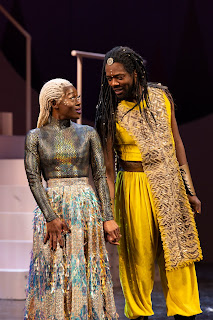In a sci-fi landscape, Don Pedra's (Ann Ogbomo) soldiers rest after battle at the estate of Leonato (Kevin N Golding,) whose daughter Hero (Taya Ming) catches the eye of young war hero Claudio (Mohammed Mansaray.) Their wedding is quickly arranged, but Pedra's brother Don John (Micah Balfour,) out of little other than spite, sabotages it by spreading a false rumour that Hero has been sleeping around, leading Claudio to publicly denounce her at the altar.
Meanwhile Leonato's niece Beatrice (Akiya Henry,) is distracted by the arrival of her ex, Benedick. In the days leading up to the doomed wedding, Pedra arranges a series of tricks to convince each of them that the other still loves them - and by doing so, to rekindle their love for real. Henry's been good in the last few things I've seen her in so I was looking forward to this but I found her Beatrice underwhelming - she comes in very aggressive from the start, so Beatrice's good-natured burns of everyone she loves come across as much harsher than playful barbs. Out of the play's most famous couple, it's Wilson's good-natured, charming Benedick who shines here.
But where the Beatrice and Benedick plot is usually what dominates Much Ado, this particular production is much more about the design, which is described as futuristic, although my first instinct was much more 1970s' idea of an alien planet - if there is a future vision it reminded me of it was the operatic final act of Mr Burns. Melissa Simon-Hartman's costumes are a sea of material and headdresses that look incredibly lush. I don't know if Jemima Robinson's set designs have suffered from the transfer to the small screen, but the collection of plastic slides and orbs by contrast look very cheap, like a Tom Baker-era Doctor Who episode where the budget was running tight. But expensive or cheap-looking, the design elements have an incredibly distracting effect: I was often too busy looking at the latest elaborate wig to follow where we were in the story.
And the production feels like the creative team might have been just as distracted by the visuals, as there's a lot of world-building (there's some recurring glowing orbs which seem to be a power source but maybe also have some religious significance?) but not a lot of work on character. On the one hand the world created here is very open around gender and sexuality, with some ambiguous clothing (I thought Curtis Kemlo's Borachio was in a ballgown at first) and Ogbomo's gender-swapped Prince trying and failing to romance Beatrice; how that world fits around a story about some particularly vicious slut-shaming, on the other hand, is a mystery. Mansaray and Ming were, however, the very rare Claudio and Hero I actually liked - they play them as very young and naïve, which is probably the only way you can salvage anything from the appalling way his character behaves, and the way hers is underwritten.
One of the best-loved comedies it may be but Much Ado has more than it share of problematic characters: In recent years the one that troubles me the most has been Leonato; I just think he has some fucking nerve sarcastically thanking Claudio and Pedro for Hero's "death" when he unquestioningly laid into his own daughter twice as hard as either of them did. Golding is very much the picture of the fluffy, lovable Leonato, which only makes the issue more stark. As for the comic subplot of the City Watch, I don't know if it was their eyesore plastic costumes that distracted me again but I couldn't really tell you anything about them. Of course, having him fade into the background isn't the worst thing you can do with Dogberry, so small mercies. But in the end, the fact that it took me a while to register that there was actually a live audience at this recording says it all: There may be a lot of darkness in the story but it's still Much Ado About Nothing, there really should be a lot more laughs than this production raises.
Much Ado About Nothing by William Shakespeare is available until March 2023 on BBC iPlayer.
Running time: 2 hours 45 minutes*.
Photo credit: Ikin Yum, Ellie Kurttz.
*the downloadable cast list on the RSC's website suggests that on stage the running time would have been 3 hours 20 minutes; I can well believe it, as as well as the interval there are some cuts in the broadcast version that look like they were quite lengthy scene changes





No comments:
Post a Comment